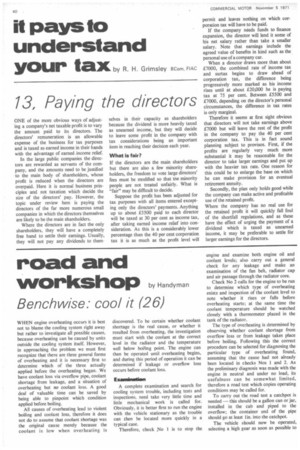it pays to understand
Page 42

If you've noticed an error in this article please click here to report it so we can fix it.
yourtax by R. H. Grimsley BCom. FIAC
13, Paying the directors
ONE of the more obvious ways of adjusting a company's net taxable profit is to vary the amount paid to its directors. The directors' remuneration is an allowable expense of the business for tax purposes and is taxed as earned income in their hands with the advantage of earned, income relief.
In the large public companies the directors are rewarded as servants of the company, and the amounts need to be justified to the main body of shareholders, whose profit is reduced when the directors are overpaid. Here it is normal business principles and not taxation which decide the size of the directors' pay. However, the topic under review here is paying the directors of the far more numerous small companies in which the directors themselves are likely to be the main shareholders.
Where the directors are in fact the only shareholders, they will have a completely free hand to settle their earnings. Usually, they will not pay any dividends to them
selves in their capacity as shareholders because the dividend is more heavily taxed as unearned income, but they will decide to leave some profit in the company with tax considerations being an important item in reaching their decision each year.
What is fair?
If the directors are the main shareholders but there are also a few minority shareholders, the freedom to vote large directors' fees must be modified so that tne minority people are not treated unfairly. What is "fair" may be difficult to decide.
Suppose the profit has been adjusted for tax purposes with all items entered excepting only the directors' payments. Anything up to about £5500 paid to each director will be taxed at 30 per cent as income tax, after taking earned income relief into consideration. As this is a considerably lower percentage than the 40 per cent corporation tax it is as much as the profit level will permit and leaves nothing on which corporation tax will have to be paid.
If the company needs funds to finance expansion, the director will lend it some of his net salary rather than take a smaller salary. Note that earnings include the agreed value of benefits in kind such as the personal use of a company car.
When a director draws more than about £7000, the combined rate of income tax and surtax begins to draw ahead of corporation tax, the difference being progressively more marked as his income rises until at about £20,000 he is paying tax at 75 per cent. Between £5500 and £.7000, depending on the director's personal circumstances, the difference in tax rates is only marginal.
Therefore it seems at first sight obvious that directors will not take earnings above £7000 but will leave the rest of the profit in the company to pay the 40 per cent corporation tax. This is in fact sound planning subject to provisos. First, if the profits are regularly very much more substantial it may be reasonable for the director to take larger earnings and put up with the heavier tax rate. One reason for this could be to enlarge the base on which he can make provision for an eventual retirement annuity.
Secondly, the plan only holds good while the company can make active and profitable use of the retained profit.
Where the company has no real use for the retained profit it will quickly fall foul of the shortfall regulations, and as these have the effect of urging the payment of a dividend which is taxed as unearned income, it may be preferable to settle fOr larger earnings for the directors.




































































































































































